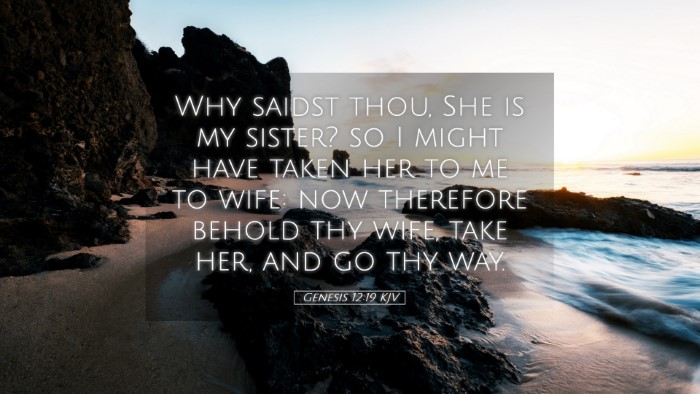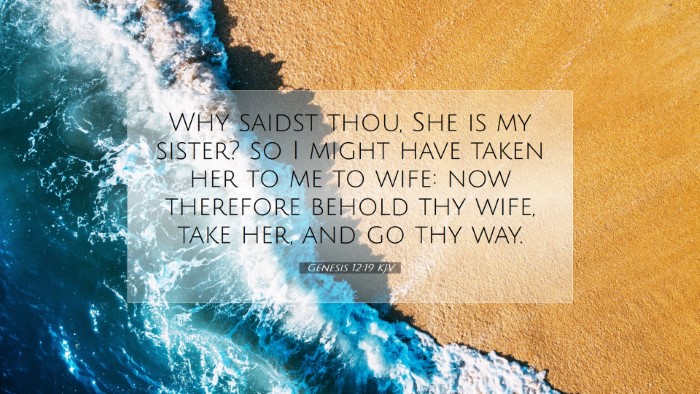Commentary on Genesis 12:19
Bible Verse: Genesis 12:19 - "Why saidst thou, She is my sister? so I might have taken her to me to wife: now therefore behold thy wife, take her, and go thy way."
Introduction
This verse occurs within the narrative of Abram's journey into Egypt, highlighting a significant moment of compromise and the resulting divine intervention. It captures the tension between faithfulness to God and the fear of man, which is a recurring theme in the biblical text.
Contextual Overview
In Genesis 12, we encounter Abram, who is called by God to leave his homeland for a promise of a great nation. However, upon arriving in Egypt during a famine, Abram's fear leads him to present Sarai, his wife, as his sister. This act of deception sets in motion a series of consequences that reveal insights into human nature and God's sovereignty.
Exposition of Key Themes
- Fear and Deception - Both Albert Barnes and Matthew Henry highlight that Abram's fear for his life led him to act deceitfully. This reflects the frailty of human nature when confronted with peril.
- The Sovereignty of God - Despite Abram's lack of faith, God intervenes to protect Sarai, demonstrating His control over circumstances and His commitment to His covenant.
- The Consequences of Compromise - Adam Clarke points out that disobedience brings about adverse consequences not only for the individual but also for others impacted by such decisions.
Analysis of Key Characters
Abram (Abraham)
Abram's actions in this narrative reveal a complex character. He is a figure of faith, yet he stumbles under pressure. Matthew Henry emphasizes that even great men of faith can falter, reminding us that divine grace is necessary for spiritual success.
Sarai (Sarah)
The predicament of Sarai raises important ethical questions. As a woman in a patriarchal society, her identity and safety were closely linked to Abram's choices. Her submission to Abram's deception highlights the vulnerability of women in ancient cultures, a theme also touched upon by Clarke.
The Pharaoh
The Pharaoh is depicted as a man of power who, unwittingly, becomes an instrument of divine judgment. Barnes notes that he acted with integrity when he sought to resolve the situation, illustrating a moral compass contrasting with Abram's deceit.
Theological Implications
This passage invites readers to contemplate the nature of faith and trust in God during moments of crisis. Abram's fear led him to lie, but God's faithfulness remained unaltered. It serves as a reminder that human frailty does not negate God's plans.
Practical Applications
- Trusting God in Difficult Times - Believers are encouraged to turn to God rather than resorting to deception when faced with trials.
- Emphasizing Integrity - This narrative calls for personal integrity in all aspects of life, particularly under pressure.
- Understanding Divine Grace - It exemplifies the grace of God that protects and redeems even those who falter.
Conclusion
Genesis 12:19 provides profound insights into the complexities of human nature and the faithfulness of God. The commentary from public domain sources such as Matthew Henry, Albert Barnes, and Adam Clarke offers depth for pastors, theologians, and scholars, inviting them to explore themes of faith, integrity, and divine sovereignty. Reflecting on this passage challenges believers to trust in God amidst their fears and to uphold truth, recognizing that God's purposes will prevail despite our failures.


